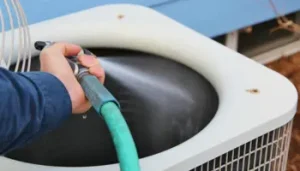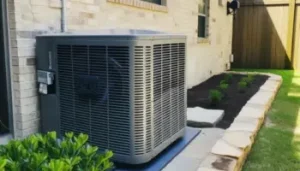Spring is a beautiful time of year, but for many, it also means the onset of seasonal allergies. As plants bloom and pollen levels rise, indoor air quality can significantly impact allergy symptoms. Fortunately, your HVAC system can play a crucial role in mitigating spring allergies and ensuring a comfortable living environment. By following a few essential tips and tricks, you can prepare your HVAC system to help reduce allergens and enhance indoor air quality.
1. Change or Upgrade Air Filters
Why It Matters
Air filters are the first line of defense against airborne allergens such as pollen, dust mites, and pet dander. A clogged or dirty filter can’t effectively trap these particles, allowing them to circulate through your home.
Actionable Tips
- Check Filter Type: Ensure you are using a high-efficiency particulate air (HEPA) filter or a high-MERV (Minimum Efficiency Reporting Value) filter. HEPA filters capture up to 99.97% of particles as small as 0.3 microns, including common allergens.
- Replace Regularly: Change your filters every 1-3 months, depending on usage and the type of filter. A clogged filter not only decreases air quality but also puts additional strain on your HVAC system, leading to higher energy bills.
- Upgrade If Necessary: Consider upgrading to a higher-MERV filter if you haven’t already. Higher-MERV filters capture smaller particles and provide better filtration, which is especially beneficial during allergy season.
2. Clean and Inspect Ductwork
Why It Matters
Dust, mold, and allergens can accumulate in your ductwork over time. When your HVAC system operates, these particles can be distributed throughout your home, aggravating allergy symptoms.
Actionable Tips
- Schedule Professional Cleaning: Hire a professional to inspect and clean your ductwork annually or biannually. They can remove accumulated dust, mold, and debris that might otherwise contribute to poor indoor air quality.
- Seal Leaks: Ensure that your ductwork is properly sealed to prevent contaminants from entering and to improve system efficiency.
- Inspect for Mold: Check for any signs of mold growth in the ducts. Mold spores can be harmful when inhaled and can worsen allergy symptoms.
3. Use Air Purifiers
Why It Matters
Air purifiers help remove allergens and particles from the air, providing additional protection against indoor pollutants.
Actionable Tips
- Choose the Right Purifier: Select air purifiers with HEPA or activated carbon filters. HEPA filters effectively capture allergens, while activated carbon filters help reduce odors and volatile organic compounds (VOCs).
- Place Strategically: Place air purifiers in high-traffic areas and bedrooms where you spend the most time. This ensures that the air you breathe is as clean as possible.
- Maintain Regularly: Follow the manufacturer’s guidelines for cleaning and replacing filters in your air purifier. Regular maintenance ensures optimal performance and efficiency.
4. Enhance Humidity Control
Why It Matters
Humidity levels play a significant role in indoor air quality. High humidity can promote mold growth, while low humidity can dry out your respiratory passages and exacerbate allergy symptoms.
Actionable Tips
- Use a Humidifier: If you live in a dry climate, consider using a humidifier to maintain indoor humidity levels between 30% and 50%. This can help keep your respiratory system moist and reduce irritation.
- Dehumidify When Needed: In humid climates or during spring, when moisture levels rise, use a dehumidifier to prevent excess moisture that can lead to mold growth and dust mites.
- Monitor Humidity Levels: Invest in a hygrometer to monitor indoor humidity levels and make adjustments as needed.
5. Optimize Ventilation
Why It Matters
Proper ventilation helps to reduce indoor pollutant levels and brings in fresh air. However, during peak pollen season, managing ventilation carefully is crucial to avoid letting outdoor allergens inside.
Actionable Tips
- Use Exhaust Fans: Turn on exhaust fans in kitchens and bathrooms to expel indoor pollutants and moisture. This helps maintain better indoor air quality.
- Avoid Open Windows: During high pollen seasons, keep windows closed to prevent pollen from entering your home. Use air conditioning to regulate temperature and air quality instead.
- Consider an Air Exchange System: If you need to improve ventilation while minimizing allergen intake, consider installing an energy recovery ventilator (ERV) or a heat recovery ventilator (HRV). These systems exchange stale indoor air with fresh outdoor air while filtering out allergens.
6. Perform Regular HVAC Maintenance
Why It Matters
Regular maintenance ensures that your HVAC system operates efficiently and effectively. It also helps identify and address potential issues before they become significant problems.
Actionable Tips
- Schedule Professional Inspections: Have your HVAC system inspected by a professional technician at least once a year. They can check for worn-out components, refrigerant levels, and overall system performance.
- Clean the System: Ensure that the HVAC system itself is clean. Dust and debris can accumulate on components, impacting performance and air quality.
- Check System Settings: Verify that your thermostat settings are optimized for allergy season. Maintain a consistent indoor temperature that promotes comfort and helps reduce allergen exposure.
7. Keep Your Home Clean
Why It Matters
Regular cleaning reduces the buildup of dust, pet dander, and other allergens in your home. A clean environment contributes to better indoor air quality and lessens the burden on your HVAC system.
Actionable Tips
- Vacuum Frequently: Use a HEPA filter to capture dust and allergens from carpets and upholstery. Vacuum high-traffic areas and areas where pets frequently roam.
- Dust with Damp Cloths: Dust surfaces with a damp cloth to prevent dust from becoming airborne.
- Wash Bedding and Curtains: Regularly wash bedding, curtains, and other fabrics that can trap allergens. Use hot water to kill dust mites and remove allergens effectively.
Conclusion
Preparing your HVAC system for spring allergies involves a combination of proactive maintenance and strategic upgrades. You can significantly improve indoor air quality and reduce allergy symptoms by focusing on filter maintenance, duct cleaning, air purifiers, humidity control, ventilation, and regular HVAC upkeep.For expert assistance with preparing your HVAC system for allergy season, trust Diamond Heating and Cooling. Our experienced technicians are dedicated to ensuring your home remains comfortable and allergen-free. Contact us today to schedule a maintenance check and enjoy a healthier, more comfortable spring season.



